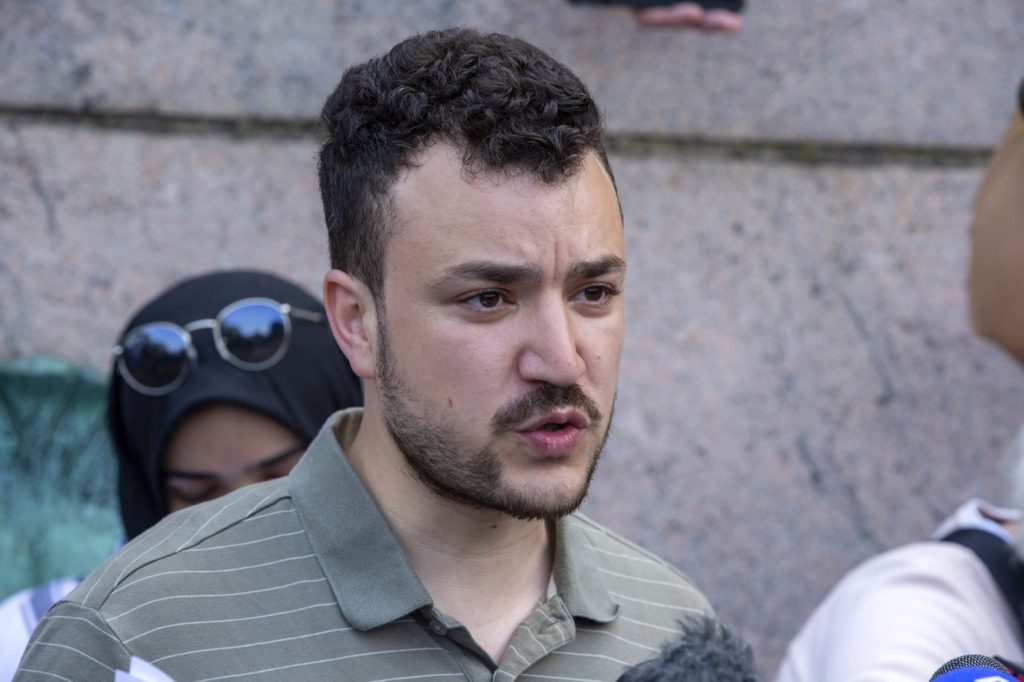JENA, La. (AP) — A significant ruling has emerged from an immigration court regarding Mahmoud Khalil, a graduate student from Columbia University and a Palestinian rights activist. The immigration judge has ordered that Khalil can be deported, a decision that his attorneys announced they would challenge in an appeal filed on Friday.
Khalil, who is a legal resident of the United States, was detained last month, marking the first arrest under the Trump administration’s intensified scrutiny of international students participating in protests against Israel's military actions in Gaza. Following his arrest, he was taken to an immigration detention center in Jena, Louisiana, which is located far from both his legal counsel and his wife, who is a U.S. citizen and is soon expecting a child.
At the heart of this case is Khalil's involvement in protests where he acted as a spokesperson for students opposing military actions in Gaza. While he participated in protests that included taking over a campus lawn, he was not involved in a separate incident where a small faction of protesters occupied a university administration building, for which others were arrested. However, Khalil’s visible participation at the protests—especially without a mask—along with his readiness to speak with the media, drew criticism and allegations of antisemitism. The White House has accused him of "siding with terrorists," yet it has not provided substantiated evidence to support such claims.
Khalil was apprehended on March 8 while in the lobby of his university-owned apartment. His legal issues stem from the government's assertion that noncitizens participating in protests deemed antisemitic and supportive of Hamas, the militant organization implicated in violence against Israel, could face deportation. Khalil's legal team maintains that he has not broken any laws and that expressing his views is protected under the First Amendment of the U.S. Constitution.
According to U.S. Secretary of State Marco Rubio, the justification for Khalil’s deportation rests on a seldom-applied statute, which allows the government to deport individuals whose presence might have "potentially serious adverse foreign policy consequences" for the United States. During the ruling, Immigration Judge Jamee E. Comans stated that the government had provided "clear and convincing evidence" that Khalil should be deemed removable from the country due to these foreign policy concerns. Previously, federal judges in New York and New Jersey had issued rulings that prevented Khalil's deportation while the legal process was ongoing.
The path forward for Khalil remains fraught with uncertainty, as his attorneys are determined to continue fighting against the ruling. They plan to appeal to the Board of Immigration Appeals and consider pursuing an asylum case on his behalf. Although the judge has found Khalil removable, his lawyer Marc Van Der Hout mentioned that proceedings would not move swiftly, with a deadline set for April 23 for seeking a waiver.
Van Der Hout characterized the situation as a blatant violation of Khalil's rights to a fair hearing and accused the government of weaponizing immigration laws to suppress dissent. This case has sparked concerns among various activists and legal experts, particularly as federal authorities have ramped up their actions against individuals criticizing Israel in the academic sphere. Some notable instances include the arrests of other campus activists, such as a scholar from Georgetown University who made critical statements about the Israel-Gaza conflict and a Brown University professor deported for attending a Hezbollah leader's funeral.










